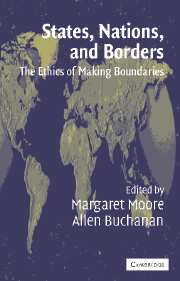Book contents
- Frontmatter
- Contents
- About the Contributors
- Acknowledgments
- 1 Introduction: The Making and Unmaking of Boundaries
- THE JEWISH TRADITION
- THE CONFUCIAN TRADITION
- THE CHRISTIAN TRADITION
- THE NATURAL LAW TRADITION
- THE ISLAMIC TRADITION
- THE LIBERAL TRADITION
- THE INTERNATIONAL LAW TRADITION
- CONCLUSION
- Index
1 - Introduction: The Making and Unmaking of Boundaries
Published online by Cambridge University Press: 24 November 2009
- Frontmatter
- Contents
- About the Contributors
- Acknowledgments
- 1 Introduction: The Making and Unmaking of Boundaries
- THE JEWISH TRADITION
- THE CONFUCIAN TRADITION
- THE CHRISTIAN TRADITION
- THE NATURAL LAW TRADITION
- THE ISLAMIC TRADITION
- THE LIBERAL TRADITION
- THE INTERNATIONAL LAW TRADITION
- CONCLUSION
- Index
Summary
This volume is concerned with one of the most pressing issues facing us today: the making and unmaking of boundaries. Even in this age of globalization – by which is usually meant capital mobility, extremely rapid methods of transportation and communication, the liberalization of economic markets, the advance of multinational corporations to many parts of the globe, and increased global economic trade – boundaries are enormously important. It matters to people's education, level of health, opportunities and life-prospects, rights and liberties which states they live in. People who migrate from one area of jurisdictional authority to another often taken great risks: Some prospective migrants die in the attempt. The coercive power of the state is often employed to prevent the migration of people across boundaries, and some states expend huge sums of money on military hardware and large armies and sacrifice their soldiers' lives, mainly in defense of existing boundaries.
One of the most destabilizing aspects of the post-Cold War period has been the alteration of boundaries, which takes place outside the rule of law and often by force. For nearly fifty years following the end of the Second World War, there was only one successful case of secession – Bangladesh, which was created out of a separatist movement, and in unique circumstances, particularly since its secession was supported both militarily and politically by India. Since the end of the Cold War, a number of new states have been created in the former Soviet Union, Yugoslavia, and Indonesia, Ethiopia, and Czechoslovakia, and there is little prospect of boundary stability and peace in the ethnically mixed, recently independent states of the first three regions, as there are a number of secessionist groups seeking to further carve them up.
Information
- Type
- Chapter
- Information
- States, Nations and BordersThe Ethics of Making Boundaries, pp. 1 - 16Publisher: Cambridge University PressPrint publication year: 2003
Accessibility standard: Unknown
- 6
- Cited by
